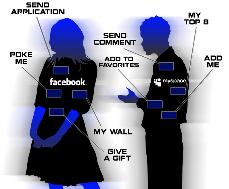Social networks keeping us apart

Social networks keeping us apart
April 8, 2009
What would the world be like without MySpace bulletins? How would we ever know what our friends were doing without Facebook status updates? How could we possibly communicate without the Internet? The world as we know it would end for many of us if we didn’t have the safety and comfort of our social networks.
While I can’t deny the convenience and temptation of MySpace and Facebook, I often wonder if these guilty pleasures come at a price.
Social networking, when used for its original purpose, can be a useful form of communication and connection. These networks are great for contacting old friends or staying in touch with those in far away locations. However, this doesn’t seem to be the main use anymore.
These sites have become a popularity contest and marker of status. Social networking sites like Facebook and MySpace have become book covers for whatever story the user wants to make up about his or her life.
“People have a fantasy identity that comes out on the Internet where they choose who they want to be and omit any negative aspects,” said Candice Baker, junior communication studies major.
Although social networks promote the idea of friendship, they often create only a fabricated illusion of relationships. Having hundreds of friends on MySpace means nothing if you can’t hold a one-on-one conversation with these friends in person or if you don’t know anything about them beyond their Internet alter egos.
One of the main appeals of the Internet is that anyone can be anything they’d like, and no one else needs to know.
Nick Trujillo, professor of communication studies, has created his very own Internet character. Gory Bateson, Trujillo’s alter ego, sings for the band the Ethnogs. In one particular YouTube video, Trujillo, as Bateson, performs his own song “Is that Viral Enuf 4 U,” in which he comically sings about the irony of Internet relationships.
“My baby Googled me the other night, couldn’t find anything on any site. So she said you’re not viral enough for me?. So I found some friends on Facebook and MySpace too. Did a little Twitter and a lot of YouTube. Got my second life on a CD-ROM, put a profile of my avatar on Match.com,” Trujillo sings.
Trujillo doesn’t necessarily believe that social networks have harmed this generation’s communication skills, but he has noticed illogical behaviors that have become representative of this technology-based youth.
“I do find it ironic where two students are sitting next to each other, not even during a class, outside, and they’re texting each other. They’re sitting right next to each other,” Trujillo said.
Because computer-mediated communication is so readily available and efficient, these sites have become wildly popular and phenomenally widespread. Unfortunately, if Internet communication becomes too prevalent, interpersonal communication could suffer.
If people rely too heavily on making friends and building social networks via the Internet, they could lose touch with reality and limit their ability to function in regular social situations.
“People get so wrapped up in the virtual community that when it comes time to interact in reality, they’re socially awkward,” said Katie Rupp, senior international relations major and a member of the debate team.
Staring at a computer screen and sending thoughts through text is not always the most effective way to express emotions. Without the ability to convey body language or tone, the Internet allows room for more misinterpretation than interpersonal communication.
While social networks have some benefits, the obsession and addiction to these sites goes far beyond the desire to communicate with others.
By allowing people to create their own ideal personas and build fabricated communities of thousands of friends, social networks have become a huge temptation. However, anytime people are allowed to mask their identities, even behind a computer screen, communication is potentially jeopardized.
While I do support the underlying purpose of these sites, I hope that everyone using them is aware and weary of the many deceptions at hand.
Leidhra Johnson can be reached at [email protected]












































































































































